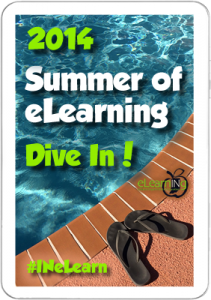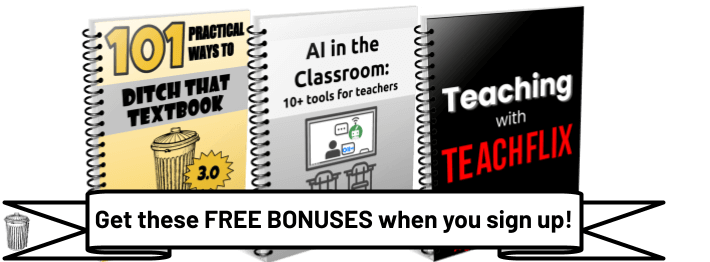

Summer is a great time to re-charge. It also offers plenty of opportunity to improve as a teacher. Here are some ideas. (Photo via photoXpress)
Summer break is here (or about here) for most schools in the United States.
Time for teachers to kick back, put their feet up and drink fruity beverages on the beach or by the pool all summer, right?
Yeah, right! Many of the great teachers I know use the summer to learn things they didn’t have time for in the midst of a busy school year. (Of course, there has to be some kicking back, relaxing and recharging the batteries during the summer!)
Every year, there are more and more great resources that any educator can tap into to hone their edtech skills.
Here are some ideas:
1. Go to a conference. The beauty of a summer conference is time to reflect and act. School-year conferences are usually followed the next day with getting back to business as usual with no time to implement what was learned. In Indiana, we’re fortunate to have 19 low-cost summer edtech conferences around the state all summer. In other areas, there’s a good chance you can find a great conference for learning and connecting.
2. Follow a conference from afar. Many conferences provide an online backchannel for the in-person event. If it’s in a public forum (i.e. a Twitter hashtag or TodaysMeet chat room), anyone can access it from anywhere. Read insights, click useful links and find new digital colleagues to follow online. It’s the next best thing to being there in person!
3. Watch sessions from the Learning Revolution virtual conference. This conference invited educators worldwide to watch engaging and useful speakers via video chat for free. More than 40 presentations are available on the conference recordings site, and include talks from great thinkers and doers like Ian Jukes, Steve Wheeler and Howard Rheingold.
4. Follow the ISTE conference. The International Society for Technology in Education conference brings edtech enthusiasts from around the world to one place. It’s in Atlanta from June 28 to July 1 this year, but the Twitter conversation reaches worldwide. Follow #ISTE14 on Twitter to catch what others are learning from and saying about the conference.
5. Watch previous ISTE conference sessions on YouTube. The ISTE 2013 Conference Playlist has 69 videos, from polished keynotes to intriguing concurrent sessions, available to watch. Sessions include 101 Free Tech Tools for Teachers, Free and Easy Tools for Super Administrators, Dive into Deeper Learning, and 30 Things You Didn’t Know Google Could Do. Adam Bellow’s Wednesday keynote is a must-watch.
6. Participate in Twitter chats. Most are weekly. All are free. Many people think they’re the best form of professional development per minute. Twitter chats are a great place to gather new ideas over the course of an hour. Many great things happen during a Twitter chat, like discussion, resources, philosophies and fun. A huge list of them is available at the Weekly Twitter Chat list.
7. Become a Google Apps for Education Ninja. This program was developed to help students and educators to improve their skills using powerful Google Products. The Ninja Program offers courses on Google Drive, Gmail, Search, Calendars, Sites, Google+, YouTube and Maps. It tracks your progress, and you can earn belts en route to becoming a ninja master.
8. Listen to education podcasts. Have a long car trip ahead of you? Mowing the grass? Going for a run? I use all three of those opportunities to listen to great education podcasts. Use a podcasts app on your smartphone or tablet and download episodes to check out. Here’s a list of eight good ones to get you started.
9. Share with others. If you learn something useful, don’t keep it to yourself. Share it with others. Tweet links to others. E-mail ideas to colleagues. My personal favorite is sharing notes via Evernote or Google Docs. If you’re at a conference or event and gather new information in digital notes, share a link to those notes with others — publicly via Twitter or other social media, or privately in messages to others.
10. Don’t overdo it. Going to conferences, watching videos or any of the above can lead to information overload. If you start to think you’ve seen too much for you to implement, that’s OK — you don’t have to implement it all. If I come away from a conference with one or two ideas I can really implement in class, I consider it a success.
What else can you do to improve over the summer? What resources can make you better? Share in a comment below!
See most of the online resources shared in this post in this list!
(For notifications of new Ditch That Textbook content and helpful links, “like” Ditch That Textbook on Facebook and follow @jmattmiller on Twitter!)
 Matt is scheduled to present at the following upcoming events:
Matt is scheduled to present at the following upcoming events:
Interested in having Matt present at your event or school? Contact him by e-mail!

Session expired
Please log in again. The login page will open in a new tab. After logging in you can close it and return to this page.
Great tips to become an ed-tech ninja. Thanks for sharing 🙂
The teachers can use the summer break to learn new things and innovations available to making teaching easier. As it will prepare them for the new session. http://www.studysear.ch